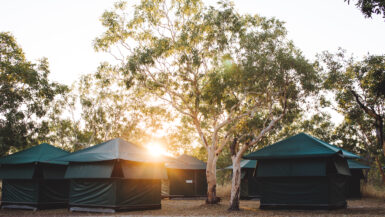Latvia is a country that is known for its natural beauty and breathtaking landscapes. With forests, lakes, and rivers, Latvia is an ideal destination for camping enthusiasts. However, with the increasing concern for the environment, it is important to choose camping sites that are eco-friendly and sustainable. These sites not only provide a great camping experience but also protect the environment. In this article, we will explore the best eco-friendly camping sites in Latvia that offer visitors an opportunity to enjoy the natural beauty of the country while also minimizing their impact on the environment. Whether you are a nature lover, an adventure seeker, or just looking for a peaceful getaway, these campsites are sure to provide a memorable experience.
Introduction to Eco-Friendly Camping and Its Benefits
Eco-friendly camping, also known as sustainable camping or green camping, is a responsible way of enjoying nature while minimizing the impact on the environment. It involves using environmentally-friendly camping gear, practices, and accommodations that promote conservation, reduce waste, and protect natural resources.
The benefits of eco-friendly camping are numerous. Firstly, it helps to preserve the natural environment and wildlife, which is essential for maintaining the ecological balance. Secondly, sustainable camping practices reduce the amount of waste produced and minimize pollution, which helps to keep the surroundings clean and healthy. Thirdly, eco-friendly camping promotes responsible tourism and helps to support local communities by using local resources and supporting local businesses.
Latvia, with its rich natural beauty and diverse camping culture, is an ideal destination for eco-friendly camping enthusiasts. The country is home to numerous national parks, nature reserves, and scenic camping sites that offer visitors the opportunity to experience the great outdoors in a sustainable way. In this article, we will explore the best eco-friendly camping sites in Latvia and provide tips for sustainable camping practices while visiting these sites.
Overview of Latvia’s Natural Beauty and Camping Culture
Latvia is a small country located in Northern Europe, known for its stunning natural landscapes and rich cultural heritage. The country has a diverse range of natural environments, including pristine forests, rivers, lakes, and coastal areas that offer endless opportunities for outdoor recreation and exploration.
Camping in Latvia is a popular pastime and a great way to experience the country’s natural beauty. Latvians have a long-standing tradition of spending time in nature, and the country has a well-established camping culture with numerous campsites and recreational areas that cater to campers of all levels.
Latvia’s national parks are some of the best places to experience the country’s natural beauty. Gauja National Park, located in the northern part of the country, is the oldest and largest national park in Latvia. The park is known for its rugged terrain, ancient forests, and stunning rock formations, and offers visitors a range of camping options, from basic tent sites to fully-equipped cabins.
Kemeri National Park, located on the west coast of Latvia, is another popular destination for nature lovers. The park is home to a unique ecosystem of bogs, forests, and wetlands and is a haven for birdwatchers and wildlife enthusiasts. The park has several camping areas, including a designated eco-camping site that offers a range of sustainable camping options.
Latvia also has a network of private campsites that cater to visitors looking for a more comfortable camping experience. These campsites offer a range of amenities, including electricity, water, and shower facilities, and are often located near popular tourist attractions.
Overall, Latvia’s natural beauty and camping culture make it an ideal destination for eco-friendly camping enthusiasts. In the following sections, we will explore the criteria for selecting eco-friendly camping sites in Latvia and highlight the top eco-friendly camping sites in the country.
Criteria for Selecting Eco-Friendly Camping Sites in Latvia
When selecting an eco-friendly camping site in Latvia, there are several factors to consider to ensure that your camping trip is sustainable and responsible. Here are some of the criteria to look for when choosing an eco-friendly camping site in Latvia:
Location
The location of the campsite is an important factor to consider when selecting an eco-friendly camping site. Look for campsites that are situated in natural settings, such as national parks, nature reserves, or other protected areas. These areas are often well-maintained and offer a range of sustainable camping options.
Amenities
When selecting an eco-friendly camping site, it is essential to consider the amenities available at the site. Look for campsites that offer sustainable amenities such as composting toilets, solar-powered showers, and recycling facilities. These amenities help to reduce waste and promote responsible tourism.
Campsite Policies
The policies of the campsite are also an important factor to consider when selecting an eco-friendly camping site. Look for campsites that have strict policies on waste management, noise pollution, and other environmental concerns. These policies help to ensure that the campsite is well-maintained and that visitors are responsible and respectful of the environment.
Local Community Support
Another factor to consider when selecting an eco-friendly camping site is the support it provides to the local community. Look for campsites that source their food and supplies from local businesses and support local conservation efforts. These campsites help to promote sustainable tourism and support the local economy.
By considering these criteria when selecting an eco-friendly camping site in Latvia, you can ensure that your camping trip is sustainable, responsible, and enjoyable. In the following sections, we will highlight the top eco-friendly camping sites in Latvia that meet these criteria.
Top Eco-Friendly Camping Sites in Latvia with Detailed Descriptions and Features
Latvia has a wide range of eco-friendly camping sites that offer visitors the opportunity to experience the country’s natural beauty in a sustainable way. Here are some of the top eco-friendly camping sites in Latvia:
1. Ziedlejas Eco-Camping
Located in the beautiful Kemeri National Park, Ziedlejas Eco-Camping is a sustainable camping site that offers visitors a range of eco-friendly accommodations, including tents, cabins, and treehouses. The campsite is powered by solar panels and has composting toilets and showers that use rainwater collected from the surrounding forest. Visitors can enjoy hiking, birdwatching, and other outdoor activities in the park, and the campsite also offers workshops on sustainable living and permaculture.
2. Klintis Eco-Camping
Situated on the banks of the Gauja River, Klintis Eco-Camping is a sustainable camping site that offers visitors a range of eco-friendly accommodations, including yurts, tipis, and tents. The campsite has composting toilets, solar-powered showers, and a communal kitchen that uses local and organic ingredients. Visitors can enjoy kayaking, fishing, and other outdoor activities in the surrounding area, and the campsite also offers workshops on sustainable living and traditional Latvian crafts.
3. Ciecere Nature Retreat
Located in the scenic Latgale region, Ciecere Nature Retreat is a sustainable camping site that offers visitors a range of eco-friendly accommodations, including tents, cabins, and a traditional Latvian farmhouse. The campsite is powered by solar panels and has composting toilets and showers that use rainwater collected from the surrounding forest. Visitors can enjoy hiking, cycling, and other outdoor activities in the surrounding area, and the campsite also offers workshops on sustainable living and traditional Latvian culture.
4. Ligatne Nature Trails Eco-Camping
Situated in the picturesque Gauja River Valley, Ligatne Nature Trails Eco-Camping is a sustainable camping site that offers visitors a range of eco-friendly accommodations, including tents, cabins, and treehouses. The campsite is powered by solar panels and has composting toilets and showers that use rainwater collected from the surrounding forest. Visitors can enjoy hiking, cycling, and other outdoor activities in the surrounding area, and the campsite also offers guided tours of the nearby Ligatne Nature Trails, which showcase the area’s rich biodiversity.
These eco-friendly camping sites in Latvia offer visitors a unique and sustainable way to experience the country’s natural beauty. By choosing these campsites, visitors can enjoy a responsible and respectful camping experience while supporting local communities and promoting sustainable tourism.
Tips for Sustainable Camping Practices While Visiting These Sites
When visiting eco-friendly camping sites in Latvia, it is important to practice sustainable camping practices to minimize your impact on the environment and promote responsible tourism. Here are some tips for sustainable camping practices while visiting these sites:
1. Reduce Waste
One of the most important things you can do to practice sustainable camping is to reduce waste. Bring reusable containers, utensils, and water bottles to minimize the amount of single-use plastics you use. Dispose of waste properly by using designated recycling and composting facilities at the campsite.
2. Use Sustainable Camping Gear
When selecting camping gear, choose environmentally-friendly options such as solar-powered lanterns, biodegradable soap, and reusable bags. Avoid using disposable products such as paper plates and plastic cutlery.
3. Respect the Environment
When camping in nature, it is important to respect the environment and leave no trace. Avoid damaging plants and trees, stay on designated trails, and do not disturb wildlife. Leave the campsite cleaner than you found it by picking up any litter or debris.
4. Conserve Water and Energy
Conserve water and energy by taking short showers, turning off lights when not in use, and unplugging devices when not in use. Use natural sources of light and heat whenever possible, such as sunlight and campfires.
By practicing these sustainable camping practices, visitors can help to minimize their impact on the environment and promote responsible and respectful tourism.
Interviews with Campsite Owners and Visitors about Their Experiences with Eco-Friendly Camping in Latvia
To gain a better understanding of eco-friendly camping in Latvia, we spoke with campsite owners and visitors about their experiences with sustainable camping in the country. Here are some of their insights:
Interview with Ziedlejas Eco-Camping Owner, Janis Ziedins
Q: What inspired you to create an eco-friendly camping site in Kemeri National Park?
A: I have always been passionate about nature and sustainable living, and I wanted to create a camping site that reflected these values. Kemeri National Park is a beautiful and unique ecosystem, and I wanted to showcase its beauty while promoting responsible and sustainable tourism.
Q: What sustainable practices do you promote at your campsite?
A: We promote a range of sustainable practices, including composting toilets, solar-powered showers, and recycling facilities. We also source our food and supplies from local businesses and support local conservation efforts.
Interview with Klintis Eco-Camping Visitor, Maria Gomez
Q: What drew you to Klintis Eco-Camping?
A: I was drawn to Klintis Eco-Camping because of its commitment to sustainability and responsible tourism. I wanted to experience Latvia’s natural beauty in a way that was respectful of the environment and the local community.
Q: What sustainable practices did you practice during your stay at the campsite?
A: I brought my own reusable containers and water bottle, and I used the composting toilets and solar-powered showers. I also made an effort to minimize my waste and dispose of it properly.
Interview with Ciecere Nature Retreat Owner, Mara Kalnina
Q: What inspired you to create a sustainable camping site in Latgale?
A: I wanted to promote sustainable living and responsible tourism in Latgale, which is a region that is often overlooked by tourists. I also wanted to showcase the region’s natural beauty and traditional Latvian culture.
Q: What sustainable practices do you promote at your campsite?
A: We use solar panels to power the campsite, and we have composting toilets and showers that use rainwater collected from the surrounding forest. We also source our food and supplies from local businesses and support local conservation efforts.
These interviews highlight the importance of sustainable camping practices and the role that eco-friendly camping sites play in promoting responsible tourism in Latvia.
Comparison of Eco-Friendly Camping Sites in Latvia with Other European Countries
Latvia is not the only country in Europe that offers eco-friendly camping options. However, it stands out as a destination that is committed to sustainable tourism and preserving its natural environment. Compared to other European countries, Latvia’s eco-friendly camping sites offer unique experiences that combine nature, culture, and relaxation.
One of the key advantages of eco-friendly camping in Latvia is the country’s vast, unspoiled wilderness. Unlike other popular camping destinations in Europe, such as France or Italy, Latvia’s camping sites are not overcrowded with tourists. This means that visitors can enjoy a more authentic and peaceful camping experience, surrounded by pristine forests, lakes, and rivers.
Another factor that sets Latvia apart from other European countries is its rich cultural heritage. Many of the country’s eco-friendly camping sites are located in or near traditional villages, where visitors can learn about Latvian traditions, crafts, and cuisine. For example, the Ligatne Nature Trails camping site offers guided tours of a 19th-century paper mill and a Soviet-era bunker, while the Mezotne Palace camping site is located near a historic castle and park.
Furthermore, Latvia’s eco-friendly camping sites are known for their high standards of sustainability and environmental protection. Many of these sites have received international certifications, such as the EU Ecolabel or the Green Key, which recognize their efforts to reduce waste, conserve energy, and promote biodiversity. By choosing to camp in Latvia, visitors can support local businesses that prioritize sustainability and contribute to the country’s vision of becoming a green destination.
Overall, Latvia’s eco-friendly camping sites offer a unique combination of natural beauty, cultural richness, and sustainability that is hard to find in other European countries. While there are many great camping destinations in Europe, Latvia stands out as a destination that is committed to preserving its natural environment and promoting responsible tourism. By choosing to camp in Latvia, visitors can experience the best of what Europe has to offer while also contributing to a more sustainable future.
Future of Eco-Friendly Camping in Latvia and Potential for Growth in Sustainable Tourism
Latvia has made significant progress in promoting eco-friendly camping and sustainable tourism in recent years. However, there is still room for growth and improvement in this area. With the increasing demand for sustainable travel options and the growing awareness of the importance of environmental protection, Latvia has the potential to become a leading destination for eco-friendly camping in Europe.
One of the key factors that will drive the growth of eco-friendly camping in Latvia is the country’s natural beauty and diverse landscapes. From the sandy beaches of the Baltic Sea to the dense forests of Gauja National Park, Latvia offers a range of camping options that cater to different interests and preferences. As more people seek to reconnect with nature and escape the hustle and bustle of city life, eco-friendly camping in Latvia is poised to become a popular choice.
Another factor that will contribute to the growth of eco-friendly camping in Latvia is the country’s commitment to sustainability and environmental protection. The Latvian government has set ambitious targets for reducing greenhouse gas emissions and promoting renewable energy, which will benefit the tourism industry as well. By investing in sustainable infrastructure and practices, Latvia can attract more eco-conscious travelers and position itself as a leader in sustainable tourism.
Furthermore, the COVID-19 pandemic has accelerated the shift towards outdoor and nature-based tourism, which bodes well for eco-friendly camping in Latvia. As more people seek safe and socially distanced travel options, camping offers a low-risk and affordable alternative to traditional forms of tourism. By promoting eco-friendly camping and outdoor recreation, Latvia can tap into this trend and attract a new generation of travelers who prioritize sustainability and wellness.
Overall, the future of eco-friendly camping in Latvia looks bright, with plenty of opportunities for growth and innovation. As more people discover the benefits of sustainable travel and seek authentic and meaningful experiences, Latvia has the potential to become a top destination for eco-friendly camping in Europe. By working together to promote sustainability, protect the environment, and support local communities, Latvia can build a thriving and resilient tourism industry that benefits everyone.
Conclusion and Call to Action for Promoting Eco-Friendly Camping in Latvia
Eco-friendly camping in Latvia offers a unique and sustainable way to experience the country’s natural beauty and cultural richness. By choosing to camp at one of Latvia’s eco-friendly camping sites, visitors can support local businesses that prioritize sustainability and contribute to the country’s vision of becoming a green destination.
From the pristine forests and lakes of Gauja National Park to the historic castles and villages of Mezotne and Ligatne, Latvia’s eco-friendly camping sites offer a range of experiences that cater to different interests and preferences. By following sustainable camping practices, such as reducing waste, conserving water, and respecting local wildlife, visitors can minimize their impact on the environment and enjoy a more authentic and meaningful camping experience.
Furthermore, eco-friendly camping in Latvia has the potential to contribute to the growth of sustainable tourism and support local communities. By investing in sustainable infrastructure and practices, Latvia can attract more eco-conscious travelers and position itself as a leader in sustainable tourism in Europe. This, in turn, can create new job opportunities and stimulate economic growth in rural areas.
In conclusion, eco-friendly camping in Latvia is an ideal way to experience the country’s natural beauty and cultural heritage while supporting sustainability and environmental protection. By choosing to camp at one of the country’s eco-friendly camping sites and following sustainable camping practices, visitors can contribute to a more sustainable future and promote responsible tourism. Let us all take a step towards eco-friendly camping and support Latvia in its efforts to become a green destination.





Leave a reply